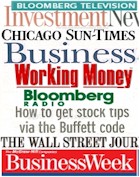|
Some of Warren
Buffett's
and
Charlie Munger's
Favorite Books
At the annual meeting of Berkshire Hathaway,
both Warren Buffett, the Chairman and CEO, and Charlie Munger,
the Vice Chairman, occasionally mention some of their favorite
books. Also Buffett sometimes mentions other books in the
annual report of Berkshire.
The following is a list of some of these books plus some others worth reading.
|
Poor Charlie's Almanac: The Wit and Wisdom of Charles
T. Munger by Charles (Charlie) T. Munger.  "Charlie
Munger is truly the broadest thinker I have ever encountered,"
wrote Bill Gates, the chairman of Microsoft. "From
business to economic principles to the design of student
dormitories to the design of a catamaran he has no
equal. This book capturing his wisdom is long overdue." "Charlie
Munger is truly the broadest thinker I have ever encountered,"
wrote Bill Gates, the chairman of Microsoft. "From
business to economic principles to the design of student
dormitories to the design of a catamaran he has no
equal. This book capturing his wisdom is long overdue."
Here's a typical quote from Munger, "Acquire
worldly wisdom and adjust your behavior accordingly.
If your new behavior gives you a little temporary
unpopularity with your peer group ... then to hell
with them."
Warning: this book is not always available —
so if you see a copy, buy it! |
The
Intelligent Investor by Benjamin Graham.  In the 2003 Annual Report of Berkshire Hathaway, Buffett
wrote, "Jason Zweig did a first-class job in
revising The Intelligent Investor, my favorite
book on investing."
In the 2003 Annual Report of Berkshire Hathaway, Buffett
wrote, "Jason Zweig did a first-class job in
revising The Intelligent Investor, my favorite
book on investing."
Benjamin Graham wrote this book for general investors
as a companion for Security Analysis. It
is still the definitive book on value investing. In
the introduction Zweig writes that the principles
he introduces will be "grounded on intensive
observation of and active participation in the securities
market over fifty years". Written for "defensive
and enterprising investors," this book contains
Graham's timeless ideas such as his definition of
an investor as opposed to a speculator and the notion
of a margin of safety. |
 Bull!
A History of the Boom, 1982-1999: What drove the
Breakneck Market--and What Every Investor Needs to Know
About Financial Cycles by Maggie Mahar. Bull!
A History of the Boom, 1982-1999: What drove the
Breakneck Market--and What Every Investor Needs to Know
About Financial Cycles by Maggie Mahar.
This book vividly details the trends and outsized egos
that fueled the recent bull market including the surge
of leveraged buyouts of 1984-1987, the mania for junk
bonds, falling short-term interest rates, the rush of
individual investors into 401(k) retirement plans, the
power (and appetites) of mutual funds and the media
frenzy that lent an unlikely allure to quarterly corporate
earnings reports.
|
The
Essays of Warren Buffett : Lessons for Corporate America
by Warren E. Buffett 
This book has been prepared by Lawrence Cunningham by
sifting through the Letters to Shareholders
that Buffett writes each year in the annual report of
Berkshire Hathaway. Each chapter is a different theme
of Buffett's investing principles. They range from Corporate
Governance through to Accounting and Taxation. These
topics may seem a little dry, but the typical Buffett
sayings make it a pleasure to read -- or just to dip
into. Here is one of them, "One of the ironies
of the stock market is the emphasis on activity. Brokers,
using terms such as `marketability' and `liquidity,"
sing the praises of companies with high share turnover...
but investors should understand that what is good for
the croupier is not good for the customer. A hyperactive
stock market is the pick pocket of enterprise."
|
Warren
Buffett Speaks: Wit and Wisdom from the World's Greatest
Investor by Janet Lowe
This is a wonderful little book of quotations by Warren
Buffett. Janet Lowe has collected together some of
his best quotations and arranged them under different
sections for each chapter ranging from About Life
through to About Investing. Within the chapters the
book is arranged in different topics starting with Live where you are happiest and Live how you want
to live in the first chapter through to Pay
your taxes and don't complain in the last chapter.
The book is small enough to slip in your pocket or
bag to have available when you are traveling and is
an ideal way to help you get inside the head of the
"world's greatest investor". |
 The Conscious Investor: Profiting from the Timeless Value Approach by John Price The Conscious Investor: Profiting from the Timeless Value Approach by John Price
A fascinating review of the strengths and weaknesses of all the standard valuation methods. It looks at the stock market methods of Benjamin Graham, John Burr Williams, Warren Buffett, Robert Wiese, Joel Greenblatt, James Tobin, William O'Neill, Maynard Keynes, James Ohlson, Bruce Greenwald, Kenneth Lee, Robert Haugen and others.
The valuation methods include net current asset value, discounted cash flow (DCF), dividend discount, payback, magic formula, residual income, CANSLIM, q-theory, PEG and PEGY ratio, benchmark, option valuation, expected return and many others.
|
|




 "Charlie
Munger is truly the broadest thinker I have ever encountered,"
wrote Bill Gates, the chairman of Microsoft. "From
business to economic principles to the design of student
dormitories to the design of a catamaran he has no
equal. This book capturing his wisdom is long overdue."
"Charlie
Munger is truly the broadest thinker I have ever encountered,"
wrote Bill Gates, the chairman of Microsoft. "From
business to economic principles to the design of student
dormitories to the design of a catamaran he has no
equal. This book capturing his wisdom is long overdue."
 Bull!
A History of the Boom, 1982-1999:
Bull!
A History of the Boom, 1982-1999:

